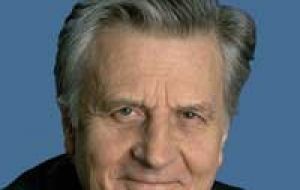MercoPress. South Atlantic News Agency
ECB admits further rate cuts; claims of “too little, too late”
 ECB President Jean-Claude Trichet
ECB President Jean-Claude Trichet The European Central Bank cut interest rates by 50 basis points to 3.25% on Thursday and signalled another reduction was possible next month, as inflation pressures ease and the Euro zone faces its first recession.
"I didn't exclude a further cut in December, depending on the data, depending on the information that will be gathered, depending on the (economic) projections that we could examine at the time, including of course the staff projections", ECB President Jean-Claude Trichet told Reuters Television in an interview. Earlier, he said the ECB Governing Council had discussed cutting rates by 75 basis points but was unanimous in its decision to lower them by 50. Some policymakers may have mentioned a 25 point cut but a 100 point reduction was not discussed, he added. Thursday's widely expected move, the second such cut in just under a month, took the ECB benchmark rate to a two-year low of 3.25%. Shortly before the ECB decision the Bank of England lowered British rates by 150 basis points to 3%. The Swiss National Bank also cut its interest rates on Thursday by a more conservative 50 basis points to 2%. Trichet said euro zone inflation is likely to hit the ECB target of close to, but below 2% in 2009. Euro-zone inflation fell to 3.2% in October after peaking 4%. He gave a relatively optimistic outlook about the evolution of inflation, "the intensification and broadening of the financial market turmoil is likely to dampen global and Euro area demand for a rather protracted period of time, and in such an environment, taking into account the strong fall in commodity prices over recent months, price, cost and wage pressures in the Euro area should also moderate". Turmoil on financial markets since mid-September appeared to be having an increasing impact on the economy, and it had generated an extraordinarily high degree of uncertainty about the economic outlook, Trichet said. The Euro zone economy, which had grown steadily since the block's creation in 1999, contracted by 0.2% in the second quarter this year and most economists expect further shrinkage in third quarter GDP figures due on November 14. The European Commission said on Monday that the Euro zone is already in a technical recession and predicted economic growth will come to a virtual standstill next year. Trichet said the ECB expected banks to make their contribution to dealing with the turmoil in financial markets. "The level of uncertainty stemming from financial market developments remains extraordinarily high and exceptional challenges lie ahead" said Trichet and insisted that the banking sector should make its contribution to restore confidence. "It is equally important that the banking sector takes fully into account the significant support measures adopted by governments to deal with the financial turmoil" he said. "These measures should be supporting trust in the financial system; we see no credit crunch" he added. But not everybody supported the ECB decision. "It is too little, too late, to avoid a major recession in the Euro zone," said Julain Callow, Europe economist at Barclays Capital. "It takes twelve months or so for cuts to feed through the economy even in good times, but right now the transmission mechanism is broken, so the lag is going to be even longer. This recession is going to be worse than the dotcom bust, especially in Southern Europe." Peter Vanden Houte, an economist at ING, said the ECB is still behind the curve. "It has finally woken up. There's no more talk about dry spells or quick rebounds. But the ECB still hasn't fully faced up to the deflationary forces threatening the Euro zone," he said. From Spain Finance minister Pedro Solbes said his country was running out of means to stimulate the economy given the constraints of Euro membership. "We have practically exhausted our room for manoeuvre. Spain has done everything it can do," he said.




Top Comments
Disclaimer & comment rulesCommenting for this story is now closed.
If you have a Facebook account, become a fan and comment on our Facebook Page!